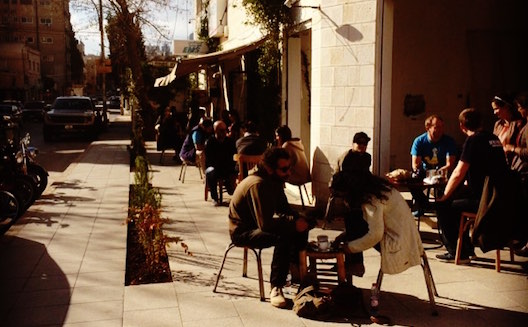How entrepreneurs transformed this Amman neighborhood


Culturally conscious entrepreneurs, like those who founded Rumi
Café, shown here, have turned Jabal Al-Weibdeh into one of
Amman's hippest neighborhoods. Their success could also lead to
undesirable changes. (Images via Josiane Smith)
In a country where travel and tourism is forecast to reach over a fifth of total GDP in the next 10 years, Jordan faces a dilemma of how to compete on a regional and global stage, cater to a global class of tourists, whilst also safeguarding its heritage and serving its people.
'A rising tide lifts all boats' is a famous adage referring to a macroeconomic principle that a prosperous economy brings benefits to every level of society. But on a smaller, local level, there may be unforeseen risks to such unregulated market growth.
The case of some café entrepreneurs in one of Amman’s oldest neighborhoods, Jabal Al-Weibdeh, could point the way for startups in places facing a similar struggle between tradition, innovation, competition and growth.
Jabal Al-Weibdeh is one of Amman’s smallest and most dynamic neighborhoods, and has been home to several embassy sites and small expat communities since the 1990s. But the threat of gentrification was navigated well by those who's families had lived there for generations and remembered another face of the place.
There were thus two demands being served in the area in the early days: one revolving around appeasing a relatively minimal foreign appetite; and the other maintaining the discreet charm, quiet and intimate community that many locals took great pride in belonging to. There was hardly any traffic and little footfall; Jabal Al-Weibdeh was not at the time an attractive or well known destination amongst outsiders.
It wasn’t until a spike in cafés opening up in the neighborhood that this historical dynamic started to shift. Over thirty new food and beverage outlets have opened in Jabal Al-Weibdeh in the past seven years, which was met by a tenfold increase in foot traffic and customers.

A former rundown residential building is now Fann wa Chai
gallery and tea bar.
Café Graffiti was the first 'concept' cafe in the area in 2012.
Niveen Karadsheh, one of Cafe Graffiti’s founders, saw the same appeal in starting a business in the neighborhood as her customers found in coming to it. “People starting getting bored and frustrated by the urbanizing and commercializing district of Jabal Amman, and wanted something quieter, fresher, and then spilt over into Jabal Al-Weibdeh,” Karadsheh said.
The location was perfect for such a cafe, as the customers to her next door neighbor, Jo Bedu - a fashion store that blended Arabic content and cultural references with design innovations and puns - saw Cafe Graffiti in a similar light: youthful, alternative and “street”.
Soon after Cafe Graffiti launched, another café called Fann wa Chai opened up close by. Initially, this could have been seen as taking precious market share from an already small customer base, but how did Karadsheh really view this competition?
“I don’t see [the other cafés in the area] as competitors. Why would I?” Karadsheh said. “We serve different customers, offer different products, put on different events. The biggest threat to our businesses is the fact that Jabal Al-Weibdeh is becoming a ‘destination,’ which attracts the wrong sort of people to our businesses, the wrong sort of shops to our streets, creates constant traffic on the roads and upsets the residents.”
The very pursuit of a quiet place and fresh design was what led Linda Al-Khoury, founding manager of Fann wa Chai, to turn an old, run down residential building in Jabal Al-Weibdeh into an art gallery and tea bar. Like Café Graffiti, the founding idea was to focus on a unique value proposition and subtle integration into the neighborhood, according to Al-Khoury.
“The few coffee shops around here were always dark and filled with smoke; so we created something with windows and light, kept it smoke-free, filled it with art and culture,” Al-Khoury said. “We did exactly the opposite of what a place like this should do. I wanted to create a public space that artists and art lovers could belong to, but that would blend with our surroundings and welcome those who felt excluded from traditional art spaces, mainly people from local communities around Amman.”

Fann wa Chai interior.
A motivation like this speaks to the dilemma facing many Jabal Al-Weibdeh residents and entrepreneurs who want to maintain the neighborhood’s charm and flavor without holding it back economically or reproducing a style that doesn’t bring Amman into a new age of creativity and innovation.
“It is not a question of keeping this neighborhood as it has always been - markets change- but they should be controlled and regulated and should involve all stakeholders,” said Ayman Taqatqa, who started out in Al-Weibdeh running its first pizza restaurant, but then launched Rumi Cafe.
“Although I’m happy with our fast growth in the past two years, many new venues are opening up without any requirement to submit business plans, concept notes or quality assurance controls to the authorities, and there are no proper decision making processes or involvement from the local community,” he continued.
Ultimately, the growth and diversification of cafés and clientele in Jabal Al-Weibdeh has been good for all businesses in the short term. Fann Wa Chai, Café Graffiti and Rumi all had unique concepts and niche markets, yet stayed in touch with their histories, contexts and customers.
Will the urban development of Jabal Al-Weibdeh compromise its personality and community? Can local entrepreneurs maintain their appeal in the face of competition from businesses with no attachment to the neighborhood, and no care for the cultural heritage or the friendly dynamics that exist between the cafés? Time will tell.


